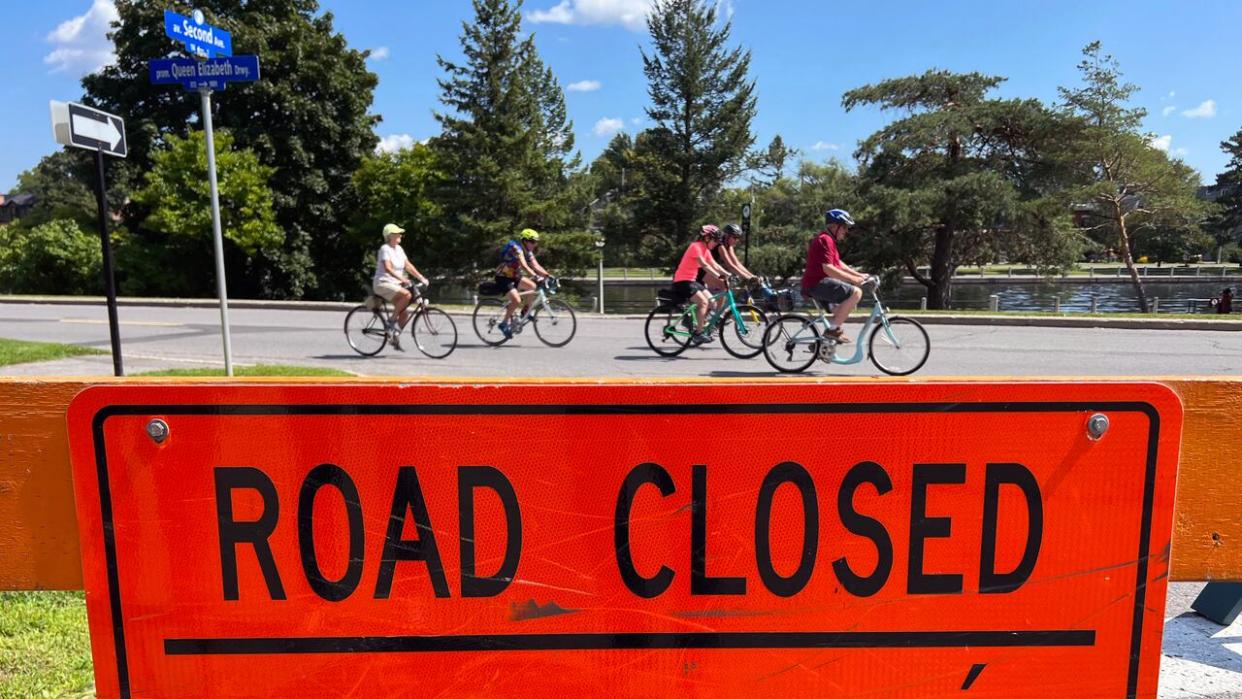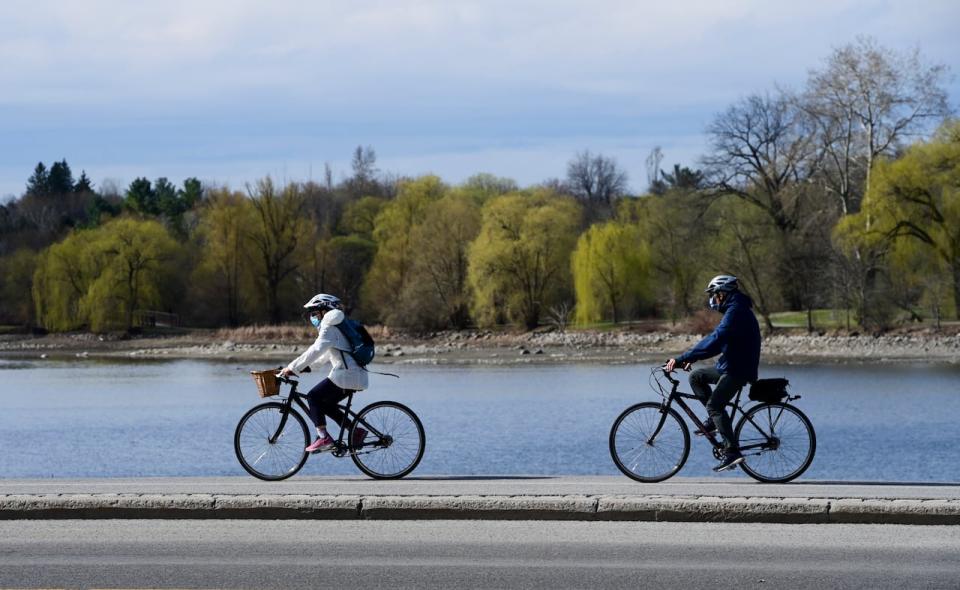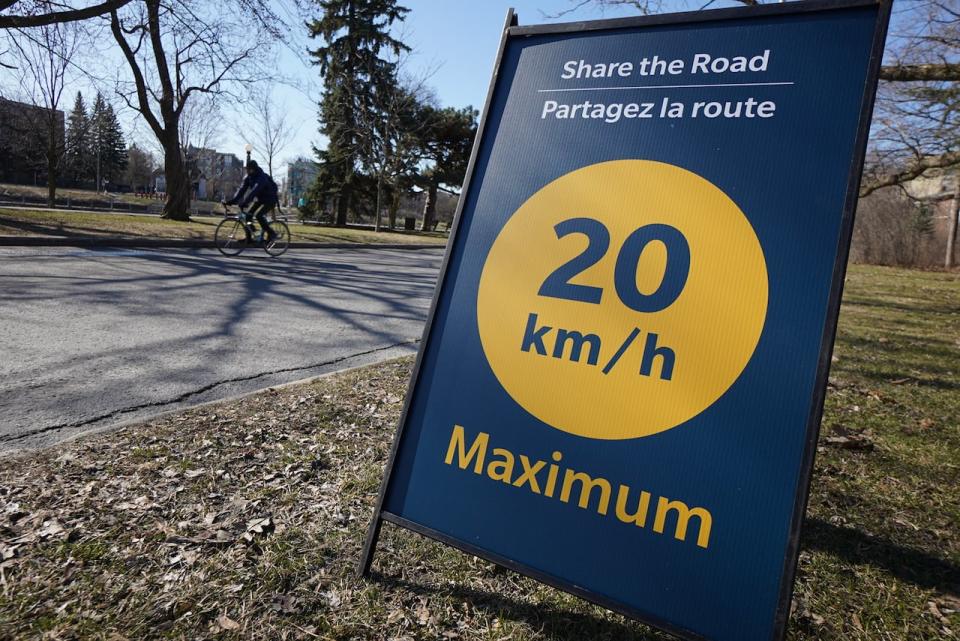NCC staff wanted to close Queen Elizabeth Driveway all the way to Preston

National Capital Commission (NCC) staff recommended shutting a much longer stretch of the Queen Elizabeth Driveway (QED) to motor vehicles this summer than was eventually closed, according to internal emails.
The recommendation by senior staff would have seen the driveway reserved for walking and cycling between Somerset and Preston streets, a stretch more than twice as long as the closure to Fifth Avenue.
It was included in a ream of internal documents obtained by CBC through an access to information request.
For months, the city and NCC have been at odds — both publicly and behind closed doors — over the stretch of federally owned and operated parkway along the canal.
Ottawa Mayor Mark Sutcliffe and NCC CEO Tobi Nussbaum sparred publicly on the issue, and city councillors have waded into the debate.
Generally, the NCC is defending its "active use" program as part of a broader push to reduce the road's importance as a commuter route, while the mayor has argued reserving the road for cyclists and pedestrians inconveniences more residents than it benefits.
CBC received NCC emails, memos and briefing notes from February to May of this year related to the active use program on the QED.
The documents shine a light on decision-making at the Crown corporation and show that more ambitious plans for the parkway were ultimately shelved in favour of minor tweaks to the existing program.

A cyclist wearing a mask rides along the QED during the COVID-19 pandemic, when the NCC debuted its active-use program on the parkway. (Justin Tang/The Canadian Press)
Program stems from pandemic
The NCC originally began reserving a portion of the QED for pedestrians and cyclists during the height of the COVID-19 pandemic, responding to calls to provide more public space for people to exercise while remaining physically distanced.
The popularity of the program, Nussbaum said, inspired the NCC to expand it.
As a result, both lanes of the QED between Somerset Street and Fifth Avenue were reserved for active use from 8 a.m. to 8 p.m. every day from July 1 to Sept. 4.
The same stretch of road was closed to vehicles on weekends and holiday Mondays through parts of the spring and fall.
In its latest annual report, the NCC noted 95 per cent of survey participants supported continuing the program.
It can't sound like we're exploring this. - NCC planner
Preston preferred by staff, emails show
In a March 15 email to senior management, an NCC transportation planner requested clarity on the QED closure to help prepare for a meeting with a community group.
Because a decision on the road hadn't yet been reached, the planner advised caution when sharing details in the meeting.
"Be careful how you approach this," the email read. "It can't sound like we're exploring this but only wish to hear [the community group] from last year's experience."
Meanwhile, NCC staff were exploring several options.
In a series of presentation slides drafted in March, staff estimated costs on six different scenarios for active use closures on the QED.
On the table for the summer was a 24/7 closure, a 12-hour-per-day closure and a weekend-only closure, each of which could stretch from Somerset to either Fifth Avenue or Preston Street.
Of these options, staff recommended closing the QED to Preston for 12 hours a day through July and August, plus weekends in the spring and fall.
That option would have cost the NCC $485,000 for the season. The cheapest option, a weekend-only closure from Somerset to Fifth, would have cost an estimated $138,250.
By March 21, the QED program still needed "a little more work on the financial side," an email read.
Two days later, an email said Bruce Devine, the NCC's senior manager of facilities and programs, had recommended closing the road to Preston in a meeting with CEO Nussbaum.

NCC CEO Tobi Nussbaum says the QED active-use program is part of a broader push to reduce the road's importance as a commuter route. (Jean Delisle/CBC)
Before reaching a decision, however, Nussbaum required further information from the city on traffic impacts, according to that email.
None of the emails show why Nussbaum ultimately chose not to extend the closure, and the CEO did not respond to an interview request.
By April 5, staff had begun drafting a news release advertising the much shorter closure to Fifth.
Nussbaum said Friday he considered a wide range of factors, including cost, convenience and the views of partners.
"There is going to be a process over the course of the coming months to figure out what's best for summer 2024," he said.
"All options will be on the table."
Concerns about community feedback
In several of the documents, NCC staff discussed what the decision may mean for the "community relations file."
The closure to Preston was based on community feedback, staff said, and emails show decision-makers weighing the potential for blowback or praise from various groups who would be affected.
Staff, for example, predicted the advocacy group Parkways for People may be "unhappy" if 24/7 access for active use was dropped, and the group did go on to criticize the plan.
On the same issue, staff anticipated community associations and BIAs in the area would "likely be pleased."
As for stopping at Fifth, the NCC expected the Dow's Lake Residents' Association "may dislike" the decision, as the group had wanted to see active use stretched to Preston.

Masked cyclists make their way along the edge of Dow's Lake, an area which would have been covered by the active use program had the recommendation of NCC staff gone ahead. (Sean Kilpatrick/Canadian Press)
City, OSEG oppose closure south of Pretoria Bridge
The documents include notes from a virtual meeting on April 21 between the NCC and representatives of various city departments and other stakeholders.
City of Ottawa traffic services, emergency services and the Ottawa Sports and Entertainment Group (OSEG) each opposed all of the QED closure options provided by the NCC.
Nonetheless, the commission was still "looking to extend closure of QED between Somerset & Preston for active transportation as early as 2024," according to the meeting notes.
In an email to CBC, director of traffic services Phil Landry said the city stands by its request that the NCC consider other options for active transportation.
The city pointed to a traffic study dated April 6 that found the closure of the QED to Fifth had caused delays for emergency services and encouraged unsafe driving on nearby streets.
But in internal emails uncovered in a separate access to information request, an NCC manager wrote that some parts of that report "should be re-examined" due to "methodological errors," potential "miscalculations" and a "misrepresentation" of the active user analysis.

QED first turned from a road for vehicles to a wide path for exercise in the spring of 2020. (Francis Ferland/CBC)
Landry said a closure ending at Preston would not alleviate traffic concerns and would "most likely increase" the number of streets in the Glebe facing more traffic.
"At the time, the City informed the NCC that it did not support closing QED at Preston Street," he said.
Mayor Sutcliffe said Wednesday that although he believes other streets in the neighbourhood may be good candidates for active transportation, he doesn't think the QED fits that purpose.
"I would not support extending the active transportation space to Preston," he said, adding he was not involved in the NCC's decision about this summer.
Program part of 'evolution,' NCC says
In an email to CBC, spokesperson Valérie Dufour said the NCC "analyzed a variety of options" before deciding to maintain the program to Fifth.
"The NCC has not made a decision yet for next year. We are currently gathering additional data and conducting further public surveys," Dufour wrote.
The QED has received more than 109,000 active use visits since May, Dufour added.
In an internal "key messages" report, NCC communications staff laid out several reasons why the commission would go ahead with the closure despite pushback from the city and OSEG.
"The experience of countless other places around the world reveal that, once initial concerns and perceptions are tested against the reality on the ground, the results are a net benefit, to commerce, retail, animation, and the general enjoyment and reputation of places that become friendlier to people on foot," it read.
"This is the evolution that the NCC wishes to encourage in the National Capital Region."
Transportation committee will be discussing data and a legal opinion from city staff about the QED program Thursday.


